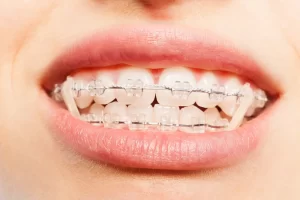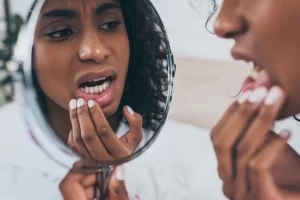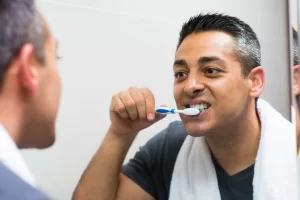Hello, Dr. Greg Stoll here with Stoll Orthodontics in Thorton, CO. As your orthodontist, I want to teach you how to properly care for your teeth during and after your orthodontic treatment, so you can have the best smile possible! Investing in the treatment process is a big commitment and we don’t want anything to harm your smile during that process.
Caring for your new smiles involves more than brushing, flossing and wearing your retainer. There are small behaviors you should be aware of that can have a negative impact on your teeth and your overall oral health. Because these habits typically come naturally to most of our patients, we want to make sure you are aware of them. Here are 5 Habits That can be Harmful to Your Teeth.
- Grinding Your Teeth
Have you ever woken up in the morning with a sore and tense jaw? Do you clench, gnash or grind your teeth while you sleep? This can cause pain and lead to serious damage to your jaw. Bruxism, also known as teeth grinding, can take place while you’re awake or while you sleep, and it can have a negative impact on your oral health. Teeth grinding can cause extensive damage if it goes unaddressed and untreated.
Patients that grind their teeth can suffer from jaw aches, toothaches, headaches, and even earaches. As you grind your teeth, your enamel is stripped away and dentin is exposed. When dentin is exposed, it can cause extreme sensitivity and discomfort. Untreated teeth grinding can lead to enamel wear, fractures in the teeth, severe jaw pain, TMJ, and misaligned teeth. After completing an orthodontic investment like braces or clear aligners, you definitely don’t want to risk injuring, deteriorating or damaging your teeth from grinding.
Typical treatment for teeth grinding consists of practicing relaxation techniques and wearing a fitted mouth guard. If you struggle with teeth grinding, let us know immediately so we can begin intervening treatments and so we can monitor your alignment and the health of your teeth.
- Chewing on Ice (or other objects)
Several of our patients chew on ice without even realizing the impact it can have on their teeth. Consistent ice-chewing can cause wear on your enamel. As your enamel erodes, your teeth become more exposed to bacteria. They are left unprotected from decay and can become more sensitive to hot and cold temperatures.
Chewing on ice or other hard objects, like fingernails or pencils can cause chipped, cracked or fractured teeth. Even if you do not feel like chewing on these objects hurts your teeth, it can cause hairline fractures that can eventually lead to cracked, damaged teeth.
If you have a chewing habit, try chewing on sugar-free gum to keep from crunching on ice or other hard objects. Let us know if you have any pain as a result of chewing on ice or other hard objects and we will determine the best way to correct the issue for you. No one wants to deal with a broken tooth, especially after completing orthodontic treatment.
- Playing sports without a mouthguard
Even in sports that do not require you to wear a mouthguard, the protection one provides can still be beneficial to your teeth.Mouthguards can prevent your teeth from chipping, breaking, and falling out. While they obviously protect your teeth, mouthguards can also protect the lips, cheeks, and soft tissue. Mouthguards can absorb the force of impact and can significantly reduce the severity of injuries to your mouth and jaw.
The American Dental Association even recommends sports players wear a properly fitted mouthguard to reduce injury and protect the mouth. Mouthguards are especially important for protecting the mouth from injury if you currently have braces or aligners.
- Drinking too many soft drinks
While it is perfectly safe to drink soft drinks during orthodontic treatment, we strongly encourage our patients to drink these beverages in moderation. Soda contains large amounts of sugar which fuel the growth of oral bacteria. An overproduction of bacteria causes an increase in cavities and tooth decay. Not only can it lead to more cavities, but soda contains citric acid, which causes enamel erosion. The overproduction of bacteria and increase in acidity are two of the major contributors to tooth decay.
Limiting your soft drink and sugary beverage intake while you have braces will help keep your teeth happy and healthy. It can also prevent long-term stains from dark-colored soda and sugary beverages.
Braces and orthodontic treatment cause dry mouth in some patients, and they quickly notice that soda doesn’t correct dry mouth. Water and hydration are extremely important for our patients in braces. So instead of grabbing your favorite soda with your lunch or dinner, try fruit-infused water to add some flavor to the most hydrating and healthiest beverage option.
- Using your teeth as a tool
Have you ever tried to use your teeth to open a package or even to bite off a stubborn fingernail? While convenience can tempt us to use our teeth to remove a tag instead of fetching the scissors, using our teeth as a tool can cause long-term harm to our mouths.
Any time you use your teeth as a tool, it can weaken their overall strength and increase the likelihood of a chip, crack, or infection in your teeth. Take the extra few minutes to grab a pair of scissors and save your mouth the unnecessary trouble.
Taking care of your teeth requires more than just brushing and flossing at the right times. Be careful what you utilize your teeth for and take care of them like you would any of the other 206 bones in your body.
At Stoll Orthodontics, your overall oral health is our greatest concern, and while we want you to love the look of your new smile, your journey is about so much more. As we embark on this journey together, we want to equip you with all the necessary knowledge to keep your smile strong as well as to make it beautiful!
Stoll Orthodontics is located in Thornton, CO, and proudly serves the Thornton, Westminster, and Broomfield communities and the surrounding area. Dr. Stoll offers early orthodontic care as well as Invisalign and braces treatment options for kids, teens, and adults. Please call us at (303) 450-2211 or schedule your complimentary in-office or virtual consultation online today.







